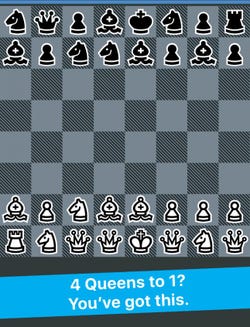“What if I pulled out the core balance and fairness of chess, and just threw in a lot of random pieces very haphazardly? My friend joked that that would be really bad chess, and the name stuck.”

Really Bad Chess, the latest game from Spelltower developer and Ridiculous Fishing programmer Zach Gage, begins with a warning: “Throw out what you've heard about openings, elegance, and fairness.”
Available now on iOS, it takes the traditional rules of chess and lays waste to them. The board is the same, and the pieces behave the same way. But you and your A.I. opponent receive a random collection of pieces. You could wind up playing with four Kings, five Bishops, and seven Pawns. Your opponent might have nine Bishops.
And why the hell not? By adding a little randomness to the mix, every game feels different as a result.
Gage told Gamasutra the idea for Really Bad Chess was born out of a desire to play chess with a friend.
“Chess is one of the big five games that has been around for a really long time that everybody knows and it’s got a lot of respect,” he said. “Being somebody who loves games, it’s always something that I have looked at and wished I was into. But it’s a game that I have never actually enjoyed playing.”
 Learning chess can be a difficult and frustrating experience, and playing it can be unsatisfying when there’s a large difference in skill level between players. Gage’s frustration led him to think about how he could make it more accessible for beginners like him.
Learning chess can be a difficult and frustrating experience, and playing it can be unsatisfying when there’s a large difference in skill level between players. Gage’s frustration led him to think about how he could make it more accessible for beginners like him.
“What if I pulled out this core idea of chess, that everything is perfectly balanced and fair, and just threw in a lot of random pieces very haphazardly? I wonder what that would do to the game. My friend joked that that would be really bad chess, and the name stuck,” he said.
It took only 10 minutes and $25 for Gage to create an early version of the game. He bought a plugin from the Unity Asset Store, made the board random, and started playing against the A.I. Adding an element of randomness made it more interesting, Gage thought, and he found he enjoyed trying to beat the computer.
“Sometimes I feel like my best designs are the ones that work right away,” he said. “This is definitely one that worked immediately.”
Gage spent another three to four months refining Really Bad Chess. He created an algorithm to generate boards, and a ranking system to determine each board’s difficulty. At the starter Rank 15, your pieces are better than the A.I.’s. As you win matches, your rank increases and the A.I.’s pieces improve. By the time you reach Rank 50, the pieces on both sides are equal in value. By Rank 100, the A.I. has better pieces. The power of each piece is measured by an assigned number. Queens are worth nine, for example, while Pawns are worth one and Rooks are worth five. The game then adds the numbers up to determine each side’s value.
 “Depending on what rank board I’m going for, I can push the algorithm to put more powerful pieces on one side or on the other side,” said Gage. “When you start the game, it generates sometimes as many as 10,000 boards to get a board that is the rank that is perfect for you.”
“Depending on what rank board I’m going for, I can push the algorithm to put more powerful pieces on one side or on the other side,” said Gage. “When you start the game, it generates sometimes as many as 10,000 boards to get a board that is the rank that is perfect for you.”
In traditional chess, each piece has a fixed starting position on the board. Pawns begin in the front row, while Knights, Rooks, Bishops, the King, and the Queen start in the back. In Gage’s game, however, starting positions are random. Your Bishops might start in the front row, for example, allowing them to quickly cross the board and capture important pieces on the other side. The one piece that never begins on the front row, however, is the Queen. The strongest piece in the game, the Queen can move any number of squares vertically, horizontally, or diagonally, and Gage found that placing it up front was too overpowered.
“Being able to get the exact right kind of randomness was really important for making the game feel friendly and deliver on what it was doing,” Gage said.
Although he feels he’ll never be a great chess player, Gage said he appreciates it more now that he’s put his own spin on it. While recently staying in a house in the woods with friends, he finally played his first chess game to completion. His opponent was the friend who inspired him to create Really Bad Chess.
Gage beat him.
About the Author(s)
You May Also Like









